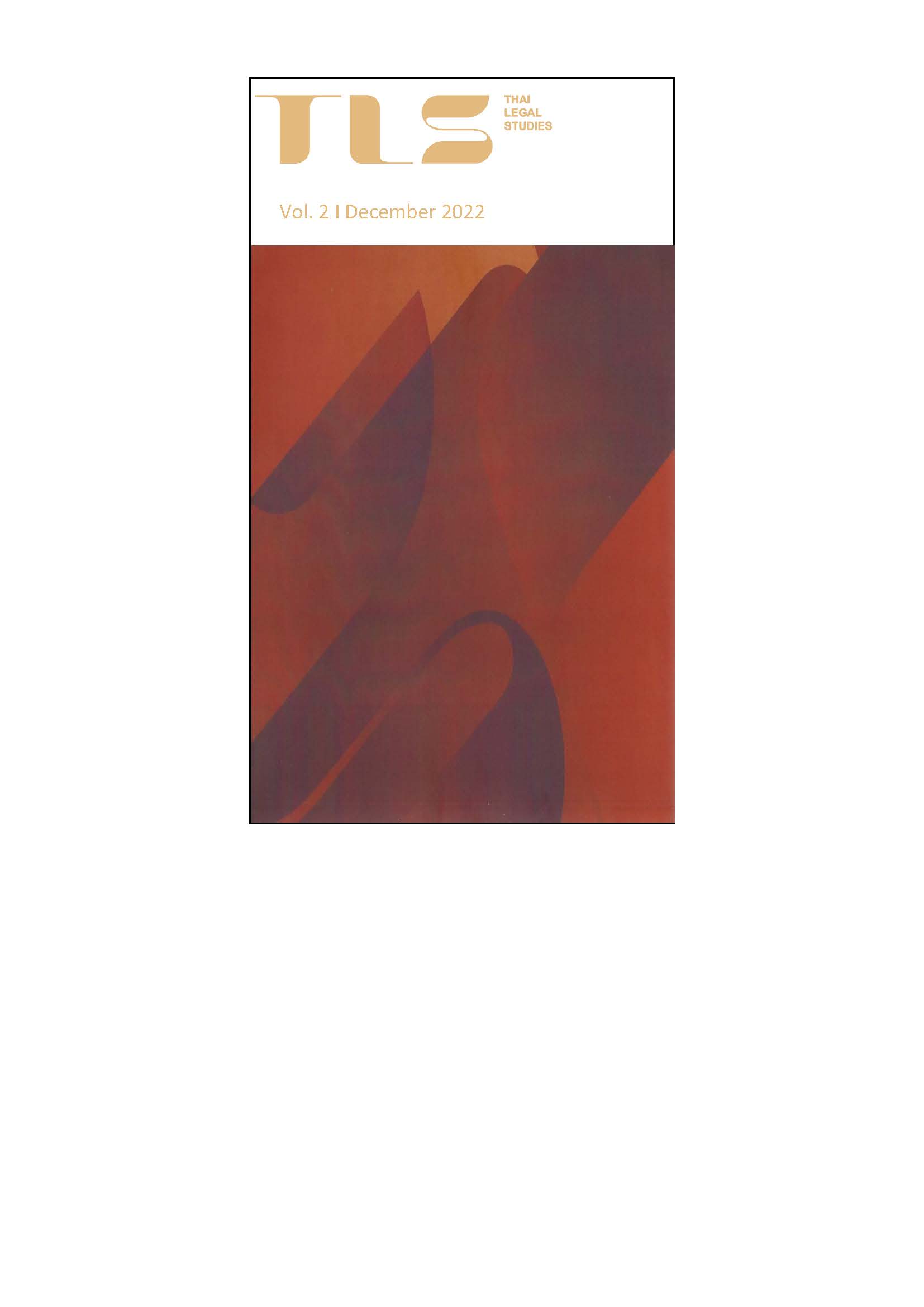Application of Natural Law Doctrine in Constitutional Court Decision No. 20/2564: A Jurisprudential Analysis
DOI:
https://doi.org/10.54157/tls.261236Keywords:
Natural laws, Constitutional court, Cicero, Same-sex marriage, JurisprudenceAbstract
In late 2021, the Constitutional Court of Thailand issued a decision concerning the constitutionality of Section 1448 of the Thai Civil and Commercial Code. Due to the decision, same-sex marriage remains unregulated. The Court implemented natural-law doctrines as their reasons. Natural-law theories are the primary opponents of same-sex marriage within the jurisprudential debate. This paper explores the natural-law doctrines used and presents an analysis of this constitutional decision by way of legal philosophy. Hume’s Law is helpful in discerning natural-law theories. The citation of Cicero’s “true law" proves to help analyse other doctrines and comment on some of the contradictions from the natural-law applications. One contradiction is the citation of Cicero’s text itself, another, from the simultaneous reference of nature and tradition. Another apparent reference of natural-law doctrines the Court used is the preservation argument. Upon the subjects of marriage, natural law, and procreation, it is worthy of exploring some of John Finnis’s natural-law theory and its similarity with this decision’s rationales. This constitutional decision is significant from the philosophical perspective and an excellent opportunity to explore the role of the legal philosophy of the ancient Greek to the contemporary period in Thai jurisprudence.
References
Apostolopoulou, Georgia. “From Ancient Greek Logos to European Rationality.” (2016) 2(7) Wisdom 118. https://doi.org/10.24234/wisdom.v2i7.144
Aquinas, Thomas. Summa Theologiae, 1a2ae. Article 1 in Thomas Aquinas, Selected Philosophical Writings (Timothy McDermott (ed) tr, Oxford University Press 1993).
Bermúdez, Juan Pablo. “Nature and the Good: An Exploration of Ancient Ethical Naturalism in Cicero’s De Finibus.” (2011) 14(2) Pensamiento y Cultura 145. https://doi.org/10.5294/pecu.2011.14.2.3
Bezemek, Christoph. “A Kelsenian Model of Constitutional Adjudication: The Austrian Constitutional Court.” (2012) 67 ZÖR 115. https://doi.org/10.1007/s00708-012-0127-5
Bezemek, Christoph. “Pure Formalism? Kelsenian Interpretative Theory Between Textualism and Realism.” In D. A. Jeremy Telman (ed), Hans Kelsen in America: Selective Affinities and the Mysteries of Academic Influence (Springer International Publishing 2016) 249–263. https://doi.org/10.1007/978-3-319-33130-0_13
Bobbio, Norberto. Thomas Hobbes and the Natural Law Tradition (Daniela Gobetti tr, University of Chicago Press 1993 [1909]).
Brown, Eric. “The Emergence of Natural Law and the Cosmopolis.” In Stephen Salkever (ed), Ancient Greek Political Thought (Cambridge University Press 2009). https://doi.org/10.1017/CCOL9780521867535.013
Cicero, Marcus Tullius. De Re Publica, De Legibus (Clinton W. Keyes tr, Harvard University Press 1928). https://doi.org/10.4159/DLCL.marcus_tullius_cicero-de_re_publica.1928
Cicero, Marcus Tullius. On the Laws (David Fott tr, Cornell University Press 2014).
Dane, Perry. “Natural Law, Equality, and Same-Sex Marriage.” (2014) 62(2) Buffalo Law Review 291–375. https://doi.org/10.7282/T3PN9900
Donhauser, Gerhard. “Nomos or Law? Hans Kelsen’s Criticism of Carl Schmitt’s Metaphysics of Law and Politics.” In Peter Langford et al. (eds), Hans Kelsen and the Natural Law Tradition (Brill 2019) 372–98. https://doi.org/10.1163/9789004390393_012
Finnis, John. “Law, Morality, and ‘Sexual Orientation.’” In John Finnis, Human Rights and Common Good: Collected Essays Volume III (Oxford University Press 2011). https://doi.org/10.1093/acprof:oso/9780199580071.001.0001
Finnis, John. “Marriage: A Basic and Exigent Good.” In John Finnis, Human Rights and Common Good: Collected Essays Volume III (Oxford University Press 2011). https://doi.org/10.1093/acprof:oso/9780199580071.001.0001
Finnis, John. Natural Law and Natural Rights (2nd edn, Oxford University Press 2011).
Fott, David. “Skepticism about Natural Right in Cicero’s De Republica.” (2014) 16 Etica & Politica 233.
Freeman, Michael. Lloyd’s Introduction to Jurisprudence (9th edn, Sweet & Maxwell 2016).
Graburn, Nelson H. H. “What Is Tradition.” (2011) 24(2/3) Museum Anthropology. https://doi.org/10.1525/mua.2000.24.2-3.6
Grimm, Dieter. Constitutionalism: Past, Present, Future (Oxford University Press 2019).
Gülenç, Nihal Petek Boyaci. “An Enquiry on Physis-Nomos Debate: Sophists.” (2016) 31(1) Synthesis Philosophica 39. https://doi.org/10.21464/sp31103
Hart, H. L. A. The Concept of Law (3rd ed, Oxford University Press 2012). https://doi.org/10.1093/he/9780199644704.001.0001
Hobbes, Thomas. Leviathan (J. C. A. Gaskin ed, Oxford University Press 2008).
Hume, David. An Enquiry Concerning Human Understanding (Peter Millican (ed), Oxford University Press 2007 [1748]). https://doi.org/10.1093/owc/9780199549900.001.0001
Hume, David. An Enquiry Concerning the Principles of Morals (J. B. Schneewind (ed), Hackett Publishing Company 1983 [1751]).
Hume, David. A Treatise of Human Nature (Lewis Amherst Selby-Bigge and P. H. Nidditch (eds), 2nd edition with text revised and variant readings by P. H. Nidditch, Oxford University Press 1978). https://doi.org/10.1093/actrade/9780198245872.book.1
Hussey, Edward. The Presocratics (Hackett Publishing Company 1972).
Kant, Immanuel. Critique of Pure Reason (Marcus Weigelt (ed), based on Max Müller’s translation, Penguin Classics 2007).
Kant, Immanuel. Groundwork for the Metaphysics of Morals (Allen W. Wood tr, Yale University Press 2018). https://doi.org/10.12987/9780300128154
Kant, Immanuel. Metaphysical Elements of Justice: Part I of the Metaphysics of Morals (2nd edn, John Ladd tr, Hackett Publishing Company, Inc. 1999).
Kant, Immanuel. Prolegomena to Any Future Metaphysics: That Will Be Able to Come Forward As Science: With Selections from the Critique of Pure Reason (Gary Hatfield tr, Cambridge University Press 2004). https://doi.org/10.1017/CBO9780511808517
Kelsen, Hans. “The Function of a Constitution” (Iain Stewart tr). In Richard Tur and William Twining (eds), Essays on Kelsen (Clarendon Press 1986).
Kelsen, Hans. General Theory of Law and State (Anders Wedberg tr, Harvard University Press 1945, reprinted by The Lawbook Exchange 2011).
Kelsen, Hans. General Theory of Norms (Michael Hartney tr, Clarendon Press 1991). https://doi.org/10.1093/acprof:oso/9780198252177.001.0001
Kelsen, Hans. Introduction to the Problems of Legal Theory (Bonnie Litschewski Paulson and Stanley L. Paulson tr, Oxford University Press 2002).
Kelsen, Hans. “Judicial Review of Legislation: A Comparative Study of the Austrian and the American Constitution.” (1942) 4(2) The Journal of Politics 183. https://doi.org/10.2307/2125770
Kelsen, Hans. Pure Theory of Law (Max Knight tr, 2nd edn, University of California Press 1967, reprinted by Lawbook Exchange 2009).
Kelsen, Hans. “A ‘Realistic’ Theory of law and the Pure Theory” (Luís Duarte d’Almeida tr). In Luís Duarte d’Almeida et al. (eds), Kelsen Revisited: New Essays on the Pure Theory of Law (Hart Publishing 2013). https://doi.org/10.5040/9781474200189
Kelsen, Hans. Society and Nature: A Sociological Inquiry (The University of Chicago Press 1943).
Kelsen, Hans. What is Justice? Justice, Law and Politics in the Mirror of Science: Collected Essays by Hans Kelsen (University of California Press 1957, reprinted by Lawbook Exchange 2013). https://doi.org/10.1525/9780520405080
Kelsen, Hans. “Who Ought to Be the Guardian of the Constitution?” In Lars Vinx tr, The Guardian of the Constitution: Hans Kelsen and Carl Schmitt on the Limits of Constitutional Law (Cambridge University Press 2015).
Koppelman, Andrew. “The Decline and Fall of the Case against Same-Sex Marriage.” (2004) 2(1) University of St. Thomas Law Journal 5.
Kosbie, Jeffrey. “Misconstructing Sexuality in Same-Sex Marriage Jurisprudence.” (2011) 6(1) Northwestern Journal of Law & Social Policy 238. https://scholarlycommons.law.northwestern.edu/njlsp/vol6/iss1/7
Lago, Pablo Antonio. “Same-sex Marriage: A Defense Based on Foundations of Natural Law.” (2018) 14(3) Revista Direito FV 1044. https://doi.org/10.1590/2317-6172201839
Lee, Patrick. “Marriage, Procreation, and Same-Sex Unions.” (2008) 91(3/4) The Monist 422. https://doi.org/10.5840/monist2008913/423
McCormick, Neil. Legal Reasoning and Legal Theory (Clarendon Press 2003).
Miller, Fred D., Jr. “The Rule of Reason in Cicero’s Philosophy of Law.” (2014) 33(2) University of Queensland Law Journal 321.
Moore, G. E. Principia Ethica (Dover Publication, 2004).
Navarro, Pablo E. “The Efficacy of Constitutional Norms.” In Luís Dearte d’Almerda et al. (eds), Kelsen Revisited: New Essays on the Pure Theory of Law (Hart Publishing 2013) 77–100. https://doi.org/10.5040/9781474200189
Nobels, Richard, and David Schiff. “The Evolution of Natural Law.” In Anne Barron et al. (eds), Jurisprudence and Legal Theory: Commentary and Materials (Oxford University Press 2005).
O’Sullivan, Richard. “Natural Law and the Common Law.” (1950) 3 Natural Law Institute Proceedings 9.
Paulson, Stanley L. “Hans Kelsen and Carl Schmitt: Growing Discord, Culminating in the ‘Guardian’ Controversy of 1931.” In Jens Meierhenrich and Oliver Simons (eds), The Oxford Handbook of Carl Schmitt (Oxford University Press 2014) 510–46. https://doi.org/10.1093/oxfordhb/9780199916931.013.34
Raz, Joseph. The Concept of a Legal System: An Introduction to the Theory of Legal System (2nd edn, Clarendon Press 2003).
Raz, Joseph. “On the Authority and Interpretation of Constitutions: Some Preliminaries.” In Larry Alexander (ed), Constitutionalism: Philosophical Foundations (Cambridge University Press 2001).
Raz, Joseph. “The Purity of the Pure Theory.” In Richard Tur and William Twinning (eds), Essays on Kelsen (Clarendon Press 1986).
Schauer, Frederich. “Hart’s Anti-essentialism.” In Luís Duarte D’Almeida et al. (eds), Reading HLA Hart’s The Concept of Law (Hart Publishing 2013).
Sievers, Juliele Maria. “A Philosophical Reading of Legal Positivism.” (PhD diss, Université Charles de Gaulle—Lille II 2015).
Solum, Lawrence B. “Natural Justice: An Aretaic Account of the Virtue of Lawfulness.” In Collin Farrelly and Lawrence B. Solum (eds), Virtue Jurisprudence (Palgrave Macmillan 2008) 167–92. https://doi.org/10.1007/978-1-349-60073-1_7
Somerville, Margaret. “Same-Sex Marriage: It’s about the Children’s Rights, Not Sexual-Orientation.” ABC Religion and Ethics (7 October 2016). https://www.abc.net.au/religion/same-sex-marriage-its-about-childrens-rights-not-sexual-orientat/10096462
Strausser, Mark. “Natural Law and Same-Sex Marriage.” (1998) 48 DePaul L. Rev 51.
Wacks, Raymond. Philosophy of Law: A Very Short Introduction (Oxford University Press 2006). https://doi.org/10.1093/actrade/9780192806918.001.0001
Warrender, Howard. “Hobbes’s Conception of Morality.” (1962) 17(4) Rivista Critica di Storia della Filosofia 434–49. https://www.jstor.org/stable/44021575
Wein, Sheldon. “David Hume and the Empiricist Theory of Law.” (1990) 9 Man and Nature (L’homme et la nature) 33. https://doi.org/10.7202/1012608ar
Wilson, Alida. “Is Kelsen Really a Kantian?” In Richard Tur and William Twining (eds), Essays on Kelsen (Clarendon Press 1986). https://doi.org/10.2307/1289195
Zajadło, Jerzy. “The Concept of Nomos–Some Remarks.” (2020) 12 Krytyka Prawa 143. https://doi.org/10.7206/kp.2080-1084.400
Sources in Thai
“แจกแจงประเด็นจากคำวินิจฉัยศาลรัฐธรรมนูญ ไม่สนข้อเสนอกฎหมาย ไม่เข้าใจสมรสเท่าเทียม.” iLaw (3 December 2021). [“Clarifying Issues from the Constitutional Court Decision: Ignoring Laws, Misunderstanding Same-sex Marriage.” iLaw (3 December 2021).] https://ilaw.or.th/node/6036
ฉัตรชัย เอมราช. “อิทธิพลของความสงบเรียบร้อยและศีลธรรมอันดีของประชาชนต่อความเสมอภาคในการสมรสของบุคคลเพศทางเลือก.” (2653) 21, 64 วารสารศาลรัฐธรรมนูญ. [Chatchai Emraja. “Influence of Public Order and Morality on Homosexual Marriage Equality.” (2020) 21, 64 Constitutional Court Journal.]
ชุติกาณจ์ สายอุตส่าห์, “ปัญหาการจำกัดสิทธิเสรีภาพตามรัฐธรรมนูญแห่งราชอาณาจักรไทยพุทธศักราช 2560.” (2561) 16(3) รมยสาร 49. [Chutikarn Saiutsa. “Problems on Limitation of the Rights and Liberties under the Constitution of the Kingdom of Thailand, B.E. 2560.” (2018) 16(3) Rommayasan 49.]
นุรักษ์ มาประณีต. “ศาลรัฐธรรมนูญแห่งราชอาณาจักรไทยภายใต้หลักนิติธรรม.” ใน ศาลรัฐธรรมนูญ: ผู้พิทักษ์หลักนิติธรรม (สำนักงานศาลรัฐธรรมนูญ 2565). [Nulak Marpraneet. “The Constitutional Court of Thailand Under the Rule of Law.” In Constitutional Court: Guardian of the Rule of Law (Office of the Constitutional Court 2022)] 121.
ประสพสุข บุญเดช. คำอธิบายประมวลกฎหมายแพ่งและพาณิชย์ ว่ากฎหมายครอบครัว (พิมพ์ครั้งที่ 21, สำนักอบรมศึกษากฎหมายแห่งเนติบัณฑิตยสภา 2558). [Prasopsuk Boondej. Explanation of the Civil and Commercial Code on the Family Law (21st edn, Legal Education Institute of the Thai Bar Association 2015).]
ปรีดี เกษมทรัพย์. นิติปรัชญา (พิมพ์ครั้งที่ 15, แก้ไขปรับปรุงโดย กิตติศักดิ์ ปรกติ, โครงการตำราและเอกสารประกอบการสอน คณะนิติศาสตร์ มหาวิทยาลัยธรรมศาสตร์ 2560). [Pridi Kasemsup. Philosophy of Law (15th ed, revised by Kitisak Prokati, Books and Teaching Materials Project, Faculty of Law, Thammasat University 2017).]
ไพโรจน์ กัมพูสิริ. คำอธิบายประมวลกฎหมายแพ่งและพาณิชย์ บรรพ 5 ครอบครัว (มหาวิทยาลัยธรรมศาสตร์ 2556). [Pairojana Kampusiri. Explanation of Civil and Commercial Code Book 5 Family (Thammasat University 2013).]
วรเจตน์ ภาคีรัตน์. ประวัติศาสตร์ความคิดนิติปรัชญา (พิมพ์ครั้งที่ 1, สำนักพิมพ์อ่านกฎหมาย 2561). [Worajed Pakeerat. Intellectual History of Philosophy of Law (1st ed, Read Law 2018).]
วิษณุ เครืองาม. กฎหมายรัฐธรรมนูญ (พิมพ์ครั้งที่ 3, นิติบรรณาการ 2530). [Wisanu Kreangam. Constitutional Law (3rd edn, Nitipanakan 1987).]
Published
Issue
Section
License
Copyright (c) 2023 Pudit Ovattananakhun

This work is licensed under a Creative Commons Attribution 4.0 International License.
Authors retain copyright and publishing rights without restrictions, but grant Thai Legal Studies the right of first publication in English and to distribute the work under a Creative Commons Attribution 4.0 International Public License (“CC BY 4.0”). It allows others to freely share the work, including the making of translations. There is no charge or fee for readers to immediately view published articles or content, and users are allowed to read, download, copy, distribute, print, search, link to the full texts of the articles, or use them for any other lawful purpose, without asking prior permission from Thai Legal Studies or the author(s), the only requirement being that an acknowledgement is given of the work’s authorship and its initial publication in English by Thai Legal Studies.







